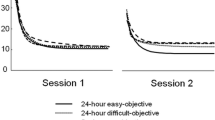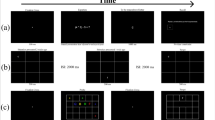Abstract
Mathematical ability is dependent on specific mathematical training but also associated with a range of cognitive factors, including working memory (WM) capacity. Previous studies have shown that WM training leads to improvement in non-trained WM tasks, but the results regarding transfer to mathematics are inconclusive. In the present study, 176 children with WM deficits, aged 7–15 years performed 5 weeks of WM training. During the training period, they were assessed five times with a test of complex WM (the Odd One Out), a test of remembering and following instructions and a test of arithmetic. The improvements were compared to the performance of a control group of 304 typically developing children aged 7–15 years who performed the same transfer tasks at the same time intervals, but without training. The training group improved significantly more than the control group on all three transfer tests (all p < 0.0001), after correction for baseline performance, age and sex. The effect size for mathematics was small and the effect sizes for the WM tasks were moderate to large. The transfer increased linearly with the amount of training time and correlated with the amount of improvement on the trained tasks. These results confirm previous findings of training-induced improvements in non-trained WM tasks including the ability to follow instructions, but extend previous findings by showing improvements also for arithmetic. This is encouraging regarding the potential role of cognitive training for education, but it is desirable to find paradigms that would enhance the effect of the training on mathematics. One of the future challenges for studying training effects is combining large sample sizes with high quality and compliance, to detect relevant but smaller effects of cognitive training.


Similar content being viewed by others
References
Adams, J. W., & Hitch, G. J. (1997). Working memory and children’s mental addition. Journal of Experimental Child Psychology, 67(1), 21–38. doi:10.1006/jecp.1997.2397.
Alloway, T. P. (2007). Automated working memory assessment manual. Oxford: Harcourt.
Alloway, T. P., & Alloway, R. G. (2010). Investigating the predictive roles of working memory and IQ in academic attainment. Journal of Experimental Child Psychology, 106(1), 20–29.
Alloway, T. P., Gathercole, S. E., Kirkwood, H., & Elliott, J. (2009). The cognitive and behavioral characteristics of children with low working memory. Child Development, 80(2), 606–621.
Ball, K., Berch, D. B., Helmers, K. F., Jobe, J. B., Leveck, M. D., Marsiske, M., et al. (2002). Effects of cognitive training interventions with older adults: a randomized controlled trial. JAMA, 288(18), 2271–2281.
Bedard, A. C., Martinussen, R., Ickowicz, A., & Tannock, R. (2004). Methylphenidate improves visual-spatial memory in children with attention-deficit/hyperactivity disorder. Journal of the American Academy of Child and Adolescent Psychiatry, 43(3), 260–268.
Bergman-Nutley, S., Sîderqvist, S., Bryde, S., Thorell, L. B., Humphreys, K., & Klingberg, T. (2011). Gains in fluid intelligence after training non-verbal reasoning in 4-year-old children: a controlled, randomized study. Developmental Science, 14(3), 591–601.
Bull, R., Espy, K. A., & Wiebe, S. A. (2008). Short-term memory, working memory, and executive functioning in preschoolers: longitudinal predictors of mathematical achievement at age 7 years. Developmental Neuropsychology, 33(3), 205–228. doi:10.1080/87565640801982312.
Butterworth, B., Varma, S., & Laurillard, D. (2011). Dyscalculia: from brain to education. Science, 332(6033), 1049–1053. doi:10.1126/science.1201536.
Chein, J. M., & Morrison, A. B. (2010). Expanding the mind’s workspace: training and transfer effects with a complex working memory span task. Psychonomic Bulletin and Review, 17(2), 193–199.
Dumontheil, I., & Klingberg, T. (2011). Brain activity during a visuospatial working memory task predicts arithmetical performance 2 years later. Cerebral Cortex,. doi:10.1093/cercor/bhr175.
Dunning, D. L., Holmes, J., & Gathercole, S. E. (2013). Does working memory training lead to generalized improvements in children with low working memory? A randomized controlled trial. Developmental Science, 16(6), 915–925. doi:10.1111/desc.12068.
Gathercole, S. E., Brown, L. H., & Pickering, S. J. (2003a). Working memory assessments at school entry as longitudinal predictors of National Curriculum attainment levels. Educational Psychology, 70, 177–194.
Gathercole, S. E., Durling, E., Evans, M., Jeffcock, S., & Stone, S. (2008). Working memory abilities and children’s performance in laboratory analogues of classroom activities. Applied Cognitive Psychology, 22, 1019–1037.
Gathercole, S. E., & Pickering, S. J. (2003). Working memory deficits in children with low achievements in the national curriculum at 7 years of age. British Journal of Educational Psychology, 70, 177–194.
Gathercole, S. E., Pickering, S. J., Knight, C., & Stegmann, Z. (2003b). Working memory skills and educational attainment: evidence from national curriculum assessments at 7 and 14 years of age. Applied Cognitive Psychology, 18, 1–16.
Geary, D. C. (2011). Cognitive predictors of achievement growth in mathematics: a 5-year longitudinal study. Developmental Psychology, 47(6), 1539–1552. doi:10.1037/a0025510.
Gray, S. A., Chaban, P., Martinussen, R., Goldberg, R., Gotlieb, H., Kronitz, R., et al. (2012). Effects of a computerized working memory training program on working memory, attention, and academics in adolescents with severe LD and comorbid ADHD: a randomized controlled trial. Journal of Child Psychology and Psychiatry and Allied Disciplines, 53(12), 1277–1284. doi:10.1111/j.1469-7610.2012.02592.x.
Green, C. T., Long, D. L., Green, D., Iosif, A. M., Dixon, J. F., Miller, M. A., et al. (2012). Will working memory training generalize to improve off-task behavior in children with attention-deficit/hyperactivity disorder? Neurotherapeutics,. doi:10.1007/s13311-012-0124-y.
Green, Strobach, & Schubert. (2014). On methodological standards in Training and Transfer effects. Psychological Research.
Gross-Tsur, V., Manor, O., & Shalev, R. S. (1996). Developmental dyscalculia: prevalence and demographic features. Developmental Medicine and Child Neurology, 38(1), 25–33.
Hattie, J. (2009). Visible learning. New York: Routledge.
Holmes, J., Gathercole, S. E., & Dunning, D. L. (2009a). Adaptive training leads to sustained enhancement of poor working memory in children. Developmental Science, 12(4), F9–F15.
Holmes, J., Gathercole, S. E., Place, M., Hilton, K. A., Dunning, D. L. (2009b). Working memory deficits can be overcome: impacts of training and medication on working memory in children with ADHD. Applied Cognitive Psychology, 12(4), 9–15.
Holmes, J., Gathercole, S. (2013). Taking working memory training from the laboratory into schools. Educational Psychology. doi:10.1080/01443410.2013.797338
Hubbard, E. M., Piazza, M., Pinel, P., & Dehaene, S. (2005). Interactions between number and space in parietal cortex. Nature Reviews Neuroscience, 6(6), 435–448. doi:10.1038/nrn1684.
Jaeggi, S. M., Buschkuehl, M., Jonides, J., & Perrig, W. J. (2008). Improving fluid intelligence with training on working memory. Proceedings of the National Academy of Sciences of the United States of America, 105(19), 6829–6833.
Kirsch, I., Deacon, B. J., Huedo-Medina, T. B., Scoboria, A., Moore, T. J., & Johnson, B. T. (2008). Initial severity and antidepressant benefits: a meta-analysis of data submitted to the Food and Drug Administration. PLoS Medicine, 5(2), e45. doi:10.1371/journal.pmed.0050045.
Klingberg, T. (2010). Training and plasticity of working memory. Trends in Cognitive Sciences, 14(7), 317–324.
Klingberg, T. (2012). Training of working memory and attention. In M. Posner (Ed.), Cognitive neuroscience of attention (pp. 475–486). New York: The Guilford Press.
Klingberg, T., Fernell, E., Olesen, P., Johnson, M., Gustafsson, P., Dahlstrîm, K., et al. (2005). Computerized training of working memory in children with ADHD—a randomized, controlled trial. Journal of the American Academy of Child and Adolescent Psychiatry, 44(2), 177–186.
Klingberg, T., Forssberg, H., & Westerberg, H. (2002). Increased brain activity in frontal and parietal cortex underlies the development of visuo-spatial working memory capacity during childhood. Journal of Cognitive Neuroscience, 14(1), 1–10.
Knops, A., Thirion, B., Hubbard, E. M., Michel, V., & Dehaene, S. (2009). Recruitment of an area involved in eye movements during mental arithmetic. Science, 324(5934), 1583–1585. doi:10.1126/science.1171599.
Landerl, K., Fussenegger, B., Moll, K., & Willburger, E. (2009). Dyslexia and dyscalculia: two learning disorders with different cognitive profiles. Journal of Experimental Child Psychology, 103(3), 309–324.
Larsson, H., Anckarsater, H., Rastam, M., Chang, Z., & Lichtenstein, P. (2012). Childhood attention-deficit hyperactivity disorder as an extreme of a continuous trait: a quantitative genetic study of 8,500 twin pairs. Journal of Child Psychology and Psychiatry and Allied Disciplines, 53(1), 73–80. doi:10.1111/j.1469-7610.2011.02467.x.
McLean, J. F., & Hitch, G. J. (1999). Working memory impairments in children with specific arithmetic learning difficulties. Journal of Experimental Child Psychology, 74(3), 240–260. doi:10.1006/jecp.1999.2516.
OECD. (2010). The high cost of low educational performance: The long-run economic impact of improving educational outcomes. Paris: OECD.
Oken, B. S., Flegal, K., Zajdel, D., Kishiyama, S., Haas, M., & Peters, D. (2008). Expectancy effect: impact of pill administration on cognitive performance in healthy seniors. Journal of Clinical and Experimental Neuropsychology, 30(1), 7–17.
Owen, A. M., Hampshire, A., Grahn, J. A., Stenton, R., Dajani, S., Burns, A. S., et al. (2010). Putting brain training to the test. Nature, 465, 775–778.
Rockwood, K. (2004). Size of the treatment effect on cognition of cholinesterase inhibition in Alzheimer’s disease. Journal of Neurology, Neurosurgery and Psychiatry, 75, 677–685.
Rotzer, S., Loenneker, T., Kucian, K., Martin, E., Klaver, P., & von, A. M. (2009). Dysfunctional neural network of spatial working memory contributes to developmental dyscalculia. Neuropsychologia, 47(13), 2859–2865.
Shalev, R. S. (2004). Developmental dyscalculia. Journal of Child Neurology, 19(10), 765–771.
Soderqvist, S., Nutley, S. B., Ottersen, J., Grill, K. M., & Klingberg, T. (2012). Computerized training of non-verbal reasoning and working memory in children with intellectual disability. Frontiers in Human Neuroscience, 6, 271. doi:10.3389/fnhum.2012.00271.
Conflict of interest
S.B.-N. is an employee of Pearson/Cogmed and had a part-time postdoc position at Karolinska Institute providing support during the analysis of this manuscript, but has no other financial disclosures. T.K. does not have any financial association to Pearson/Cogmed.
Author information
Authors and Affiliations
Corresponding author
Rights and permissions
About this article
Cite this article
Bergman-Nutley, S., Klingberg, T. Effect of working memory training on working memory, arithmetic and following instructions. Psychological Research 78, 869–877 (2014). https://doi.org/10.1007/s00426-014-0614-0
Received:
Accepted:
Published:
Issue Date:
DOI: https://doi.org/10.1007/s00426-014-0614-0




